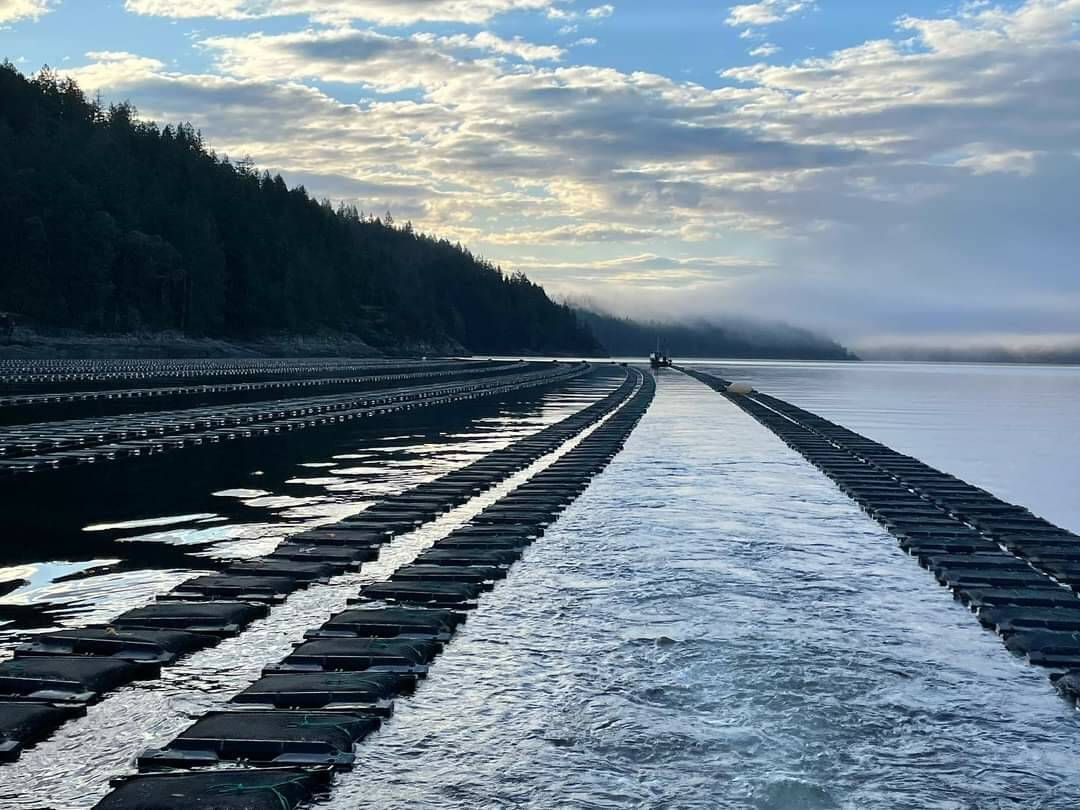Finding litter on the beach has become a normal occurrence, but, unbeknownst to many, some of the objects that wash up on our shores are meant to be reused.
Now, clean-up volunteers are asking conscientious beachgoers or private owners to skip the garbage bin whenever they come across black, bendy and mesh plastic objects.
Over the span of about eight or nine months, volunteers at the Washington State University’s Community Litter Cleanup Program have collected over 320 geoduck tubes on Whidbey shores, with a large quantity being recovered from the Keystone area due to the currents. Some oyster nets, which are bigger, flat and rectangular, were also in the mix.
Recently, volunteers have set up a recycle basket at the university’s building in Coupeville, where community members can drop off the nets. The basket sits on the porch located at 390 North Main St.
Geoducks — pronounced “gooey-ducks” — are the world’s largest burrowing clam, averaging a weight of 2.07 pounds, and can live up to 168 years of age or more, according to the Washington Department of Fish and Wildlife.
Despite their arguably unappealing look, these mollusks deserve praise for improving water quality by absorbing excess nutrients and are a popular food in the Pacific Northwest, where they get plucked from the sand by a variety of recreational and commercial harvesters.
Geoduck tubes serve to protect small geoduck seeds from predators until they are big enough to dig and protect themselves. A farmed acre might hold 25,000 or more tubes, which are half buried in the sand.
Some gear might get lost due to storms, contributing to the issue of plastic pollution in our marine ecosystems. On some rare occasions, volunteers find a few oyster nets as well, which can be dropped off at the university.
For years, volunteers have been finding the same mysterious object. While most could not be traced to the source, many of the nets displayed the phone number of Taylor Shellfish Company, the largest producer of farmed shellfish in the United States.
After getting a phone call from the group over three years ago, Taylor Shellfish has been collaborating with the cleanup program by taking any of the gear found by the volunteers, as well as the gear from other shellfish companies and recreational harvesters.
According to Director of Regulatory Affairs Erin Ewald, the company also partners with other partners, including the Washington Sea Grant, the Pacific Education Institute, local Land Trusts and more.
Out of the 328 nets recovered in less than a year, 37 belonged to Taylor Shellfish, while the rest belonged to other growers. Taylor Shellfish has made arrangements with those growers in case they wanted their gear back, while recycling non usable or salvageable materials, Ewald wrote in an email to the Whidbey News-Times.
The company has been using high-density polyethylene mesh tubes that use less plastic and take up less space, Ewald said. The material is safer than recycled plastic, as it eliminates the risk of the geoducks absorbing contaminants from the gear, she said.
Additionally, it’s more durable than biodegradable materials and quite expensive, therefore it’s in the company’s interest to ensure all lost gear is retrieved and put back to work.
The company is certified by the Aquaculture Stewardship Council, meaning it complies with responsible farming standards.
Yet, Ewald said, Taylor Shellfish continues to look for new materials that can minimize environmental impacts.
“If it floats away it’s not doing the job it was meant to do,” she said. “We want gear that stays where it’s supposed to and does the job we need it to do.”
Every year, Ewald estimated, Taylor Shellfish harvests around 800,000 pounds of geoducks, “which is a small percentage of all the geoducks that are harvested in Washington State,” she said.
According to Darwin Christopherson, a volunteer at the Community Litter Cleanup Program, volunteers pick up an average of six to eight nets per weekly cleanup in a beach section that averages ¾ of a mile in length.
Sometimes, volunteers and beachgoers recover mussel discs from Penn Cove Shellfish’s farms.
Farm Manager Zane Malloy said the disks are made of recyclable plastic that is designed to float and wash up on the beaches when they get lost. This way, they can be recovered during the company’s quarterly beach clean up sessions, where crews remove any piece of trash from the shores of Penn Cove.
Community members who find these discs can either recycle or return them to the owner.
While aquaculture gear does not represent the biggest source of beach pollution, Christopherson said, it’s still trash that needs to be minimized.



